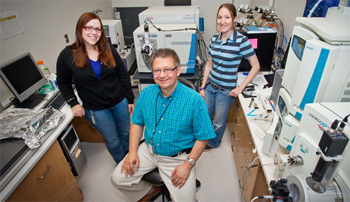 A sad consequence of methamphetamine abuse is the increased risk of HIV infection.
A sad consequence of methamphetamine abuse is the increased risk of HIV infection.
Researchers at the UNMC are investigating the damage to the human body from the combined effects of meth use, HIV and the antiretroviral drugs used to treat the disease.
With a $3.3 million grant from the National Institute of Drug Abuse — a division of the National Institutes of Health — the researchers will use a unique systems biology approach to analyze how these three elements interact and react with each other and the human immune system.
 |
From left: Melinda Wojtkiewicz, researcher, Pawel Ciborowski, Ph.D., director of the Mass Spectrometry and Proteomics Core Facility at UNMC, and Stacy Wolfe, a research technologist. Behind them is the Thermo Electron’s LTQ Orbitrap XL ETD mass spectrometer used for analysis of peptides with post-translational modifications, protein quantification and identification. To the right is the Thermo Electron LCQ Deca XP for protein identification. |
“The question is how does exposure to the HIV virus, antiretroviral drugs, methamphetamine or any combination of the three together, affect immune cells,” Dr. Ciborowski said.
They hope to find answers by looking for new and unexpected relationships in gene expression and in the nuclear protein of the macrophage, an immune cell, that represent new therapeutic targets for a number of diseases, he said.
|
“We hypothesize that the systems biology approach will provide unique information that will lead to identification of new paradigms on how the human macrophage is regulated in the complex environment of HIV infection, meth and antiretroviral drug therapy,” Dr. Ciborowski said.
“This type of research project shows that the support for infrastructure at UNMC, such as the mass spectrometry and proteomics core facility, and bringing interdisciplinary investigators together to solve problems, lets us successfully compete on the national stage for large grants, enabling our cutting-edge biomedical research,” Dr. Fox said.